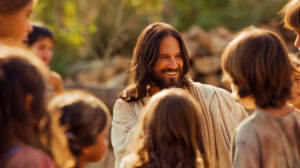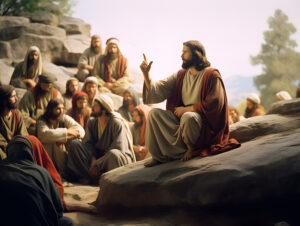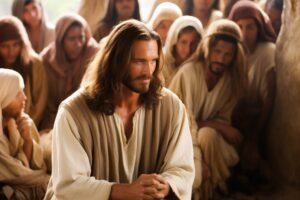Posted by Roberta Grimes • May 17, 2025 • 8 Comments
Jesus, The Teachings of Jesus
I come to the garden alone,
While the dew is still on the roses,
And the voice I hear falling on my ear
The Son of God discloses.
And He walks with me, and He talks with me,
And He tells me I am His own;
And the joy we share as we tarry there,
None other has ever known.
He speaks, and the sound of His voice
Is so sweet the birds hush their singing,
And the melody that He gave to me
Within my heart is ringing.
And He walks with me, and He talks with me,
And He tells me I am His own;
And the joy we share as we tarry there,
None other has ever known.
– Charles A. Miles (1868-1946), from “In the Garden” (1913
 I am surprised to be able to announce to you that there are actual Christian theologians who now agree with Thomas and me when we tell you that no one ever had to die for our sins. These scholars now say that the very notion of the need for a human sin-sacrifice always was a nonsensical idea, which of course we know that it always was; although in the linked article, this particular worthy looks to medieval church history for a lot of her evidence that the concept is plain wrong. Thomas and I, on the other hand, can look farther back, at the words of Jesus, to know for certain both that the God that Jesus introduced to us loves each of us infinitely and eternally, and that God never holds our failings against us. Game, set, and match! And just as importantly, the Jesus of the Gospels for certain did not die for our sins.
I am surprised to be able to announce to you that there are actual Christian theologians who now agree with Thomas and me when we tell you that no one ever had to die for our sins. These scholars now say that the very notion of the need for a human sin-sacrifice always was a nonsensical idea, which of course we know that it always was; although in the linked article, this particular worthy looks to medieval church history for a lot of her evidence that the concept is plain wrong. Thomas and I, on the other hand, can look farther back, at the words of Jesus, to know for certain both that the God that Jesus introduced to us loves each of us infinitely and eternally, and that God never holds our failings against us. Game, set, and match! And just as importantly, the Jesus of the Gospels for certain did not die for our sins.
 The religion that the Roman Emperor Constantine created in the year 312 C.E. was effectively all that remained of Jesus’s Way as early as the end of the Fourth Century. The Lord’s followers who escaped to the wilderness during the Roman campaign of annihilation against all the Jesus-followers who did not hew to Constantine’s ideas became what Christianity now thinks of as the Desert Fathers and Mothers. They were generally monks and nuns who lived simply, while more and more as the years and then the centuries passed, the faith that they were keeping became the same one that Constantine’s 325 C.E. Council of Nicaea and the later First Century Christian Councils were forming and sealing for the ages. Much as we might like now to go back from here to a time before Constantine’s day to selectively pick up again a simpler Christianity, there does not seem to be any such Christianity to be found.
The religion that the Roman Emperor Constantine created in the year 312 C.E. was effectively all that remained of Jesus’s Way as early as the end of the Fourth Century. The Lord’s followers who escaped to the wilderness during the Roman campaign of annihilation against all the Jesus-followers who did not hew to Constantine’s ideas became what Christianity now thinks of as the Desert Fathers and Mothers. They were generally monks and nuns who lived simply, while more and more as the years and then the centuries passed, the faith that they were keeping became the same one that Constantine’s 325 C.E. Council of Nicaea and the later First Century Christian Councils were forming and sealing for the ages. Much as we might like now to go back from here to a time before Constantine’s day to selectively pick up again a simpler Christianity, there does not seem to be any such Christianity to be found.
 And it also is turning out to be sadly impossible to interact directly with the genuine God using any form of a human religion. The reason why this is true lies in the nature of God as living and personal, internal, spiritual, and love-based; while all religions by their essential nature are uniformly external, static, dogmatic, and fear-based. Religions can make group introductions to God, and those introductions can feel uplifting and ecstatic, with lots of music and chanting and so on; but for their happy feeling to be sustained for long, the religion always must then withdraw and leave you alone with the one-on-one sacred spiritual mystery of God. Please read the first part of this paragraph again! We think of religion and God as going together like love and marriage, a horse and carriage, white on rice, and like every other inseparable pair of words that you can think of. We consider religions, and Christianity in particular, as our very key to begin to know God. But in fact, because all religions teach us to fear the power and the judgment of God, religions serve at best to act just as a transitional emotional lift. Ultimately, unless we leave them as we seek our closer walk, they will become a fear-based barrier between us and the genuine Godhead.
And it also is turning out to be sadly impossible to interact directly with the genuine God using any form of a human religion. The reason why this is true lies in the nature of God as living and personal, internal, spiritual, and love-based; while all religions by their essential nature are uniformly external, static, dogmatic, and fear-based. Religions can make group introductions to God, and those introductions can feel uplifting and ecstatic, with lots of music and chanting and so on; but for their happy feeling to be sustained for long, the religion always must then withdraw and leave you alone with the one-on-one sacred spiritual mystery of God. Please read the first part of this paragraph again! We think of religion and God as going together like love and marriage, a horse and carriage, white on rice, and like every other inseparable pair of words that you can think of. We consider religions, and Christianity in particular, as our very key to begin to know God. But in fact, because all religions teach us to fear the power and the judgment of God, religions serve at best to act just as a transitional emotional lift. Ultimately, unless we leave them as we seek our closer walk, they will become a fear-based barrier between us and the genuine Godhead.
 This is why Jesus was so frankly hostile to the clergy of His day. They were interposing themselves between God and the people, and this was something that Jesus viewed as a terrible spiritual crime! Even worse, they were substituting human-made traditions (Sunday Mass, anyone?) for the deeply one-on-one internal relationship with each of us that is what the genuine and profoundly spiritual God of All actually wants. Jesus said to a passel of religious lawyers, “Why do you transgress the commandment of God for the sake of your tradition?… You hypocrites! Rightly did Isaiah prophesy of you: ‘This people honors me with their lips, but their hearts are far away from me. But in vain do they worship me, teaching as doctrines the precepts of men’” (MT 15:3-9). As Jesus said to the woman at the well near the start of His ministry, 23“An hour is coming, and now is, when the true worshipers will worship the Father in spirit and truth; for such people the Father seeks to be His worshipers. 24 God is Spirit, and those who worship Him must worship in spirit and truth” (JN 4:23-34).
This is why Jesus was so frankly hostile to the clergy of His day. They were interposing themselves between God and the people, and this was something that Jesus viewed as a terrible spiritual crime! Even worse, they were substituting human-made traditions (Sunday Mass, anyone?) for the deeply one-on-one internal relationship with each of us that is what the genuine and profoundly spiritual God of All actually wants. Jesus said to a passel of religious lawyers, “Why do you transgress the commandment of God for the sake of your tradition?… You hypocrites! Rightly did Isaiah prophesy of you: ‘This people honors me with their lips, but their hearts are far away from me. But in vain do they worship me, teaching as doctrines the precepts of men’” (MT 15:3-9). As Jesus said to the woman at the well near the start of His ministry, 23“An hour is coming, and now is, when the true worshipers will worship the Father in spirit and truth; for such people the Father seeks to be His worshipers. 24 God is Spirit, and those who worship Him must worship in spirit and truth” (JN 4:23-34).
We soon learn why Jesus is so irritated by these clergyfolks. Basically, they won’t listen to and learn from Jesus what He teaches, and yet the religion-based, fear-based nonsense that they are teaching is a barrier which divides the loyalties of those who might otherwise simply be following Jesus. So the Lord mutters to the clergy, “But woe to you, scribes and Pharisees, hypocrites, because you shut off the kingdom of heaven from people; for you do not enter in yourselves, nor do you allow those who are entering to go in” (MT 23:13). Wow, that is quite an indictment!
 However, none of this that was repeatedly said by Jesus to the clergy of His day was remembered as warnings by those who created Constantine’s Christian religion, so Christianity as it is practiced today contains all the faults of the religions that were current in Jesus’s time, and then some! As Thomas and I have talked… or, well, as we have frankly argued about how we might find a way to go back and speculate in this space about how Jesus’s Way could have developed if Constantine never had been born, I don’t know what I said to my beloved friend that prompted this, but at one point last fall, Thomas exploded at me in frustration. He said indignantly in my mind, “Stop thinking like a Christian! Just stop it! Jesus was never a Christian!” Well, of course He never was. Jesus was always a Jew! And without Constantine, we would have had no First Council of Nicaea in the year 325 C.E., and no later Christian Councils, would we? We would have had no smallest bit of any version of modern Christianity at all!
However, none of this that was repeatedly said by Jesus to the clergy of His day was remembered as warnings by those who created Constantine’s Christian religion, so Christianity as it is practiced today contains all the faults of the religions that were current in Jesus’s time, and then some! As Thomas and I have talked… or, well, as we have frankly argued about how we might find a way to go back and speculate in this space about how Jesus’s Way could have developed if Constantine never had been born, I don’t know what I said to my beloved friend that prompted this, but at one point last fall, Thomas exploded at me in frustration. He said indignantly in my mind, “Stop thinking like a Christian! Just stop it! Jesus was never a Christian!” Well, of course He never was. Jesus was always a Jew! And without Constantine, we would have had no First Council of Nicaea in the year 325 C.E., and no later Christian Councils, would we? We would have had no smallest bit of any version of modern Christianity at all!
 Jesus was always a Jew. Absolutely! He was in fact a very well-educated, and a highly observant young Jewish man, and we know this because of the ease with which He read publicly from the Torah on each Sabbath Day. This famous quotation comes at the start of His ministry, right after His baptism and His forty days of being tested in the Wilderness, and then His earliest miraculous healings: 16 “And He came to Nazareth, where He had been brought up; and as was His custom, He entered the synagogue on the Sabbath, and He stood up to read. 17 And the scroll of the prophet Isaiah was handed to Him. And He opened the scroll and found the place where it was written,
Jesus was always a Jew. Absolutely! He was in fact a very well-educated, and a highly observant young Jewish man, and we know this because of the ease with which He read publicly from the Torah on each Sabbath Day. This famous quotation comes at the start of His ministry, right after His baptism and His forty days of being tested in the Wilderness, and then His earliest miraculous healings: 16 “And He came to Nazareth, where He had been brought up; and as was His custom, He entered the synagogue on the Sabbath, and He stood up to read. 17 And the scroll of the prophet Isaiah was handed to Him. And He opened the scroll and found the place where it was written,
18 ‘The Spirit of the Lord is upon Me,
Because He anointed Me to preach the gospel to the poor.
He has sent Me to proclaim release to the captives,
And recovery of sight to the blind,
To set free those who are oppressed,
19 To proclaim the favorable year of the Lord.’
20 And He closed the scroll, gave it back to the attendant and sat down; and the eyes of all in the synagogue were fixed on Him. 21 And He began to say to them, ‘Today this Scripture has been fulfilled in your hearing’” (LK 4:16-21).
 Notice that we are told that Jesus did this every week: it was His custom. He easily read the ancient Hebrew language, and He knew exactly where in Isaiah to find the passage that He wanted to read to them that day. While He was on earth, Jesus was a devout and a very well-educated Jew. I ruminated on this information briefly when Thomas and I first had this seminal conversation, which was sometime back last fall. Then I found an Orthodox Jewish Chabad (the “Ch” is pronounced as a hard ‘K”) in the Boston area, and I put myself on their mailing list, where I have been now for the past six months (they address me as “Robert”, which is fine). And already, my perspective has profoundly changed.
Notice that we are told that Jesus did this every week: it was His custom. He easily read the ancient Hebrew language, and He knew exactly where in Isaiah to find the passage that He wanted to read to them that day. While He was on earth, Jesus was a devout and a very well-educated Jew. I ruminated on this information briefly when Thomas and I first had this seminal conversation, which was sometime back last fall. Then I found an Orthodox Jewish Chabad (the “Ch” is pronounced as a hard ‘K”) in the Boston area, and I put myself on their mailing list, where I have been now for the past six months (they address me as “Robert”, which is fine). And already, my perspective has profoundly changed.
 Reading these weekly messages from a young Orthodox Rabbi and watching his videos, putting myself fully into his Jewish congregation while I also read and commune with the Orthodox Jewish Teacher known as Jesus of the Gospels makes me feel empowered now to relate to my eternal God in a deeper and richer way. These Jews are more closely tied to their Scriptures and to their own spiritual journeys than are most of the Christians that I ever have known, for whom spirituality seems to feel more distant and less joyous; just fundamentally, the Jews in my Chabad seem to be more on a first-name, on a less formal and almost a playful basis in their relationship with God. Oh, pardon me: in their relationship with G-d. There is a deference and respect about saying the name of G-d which Orthodox Jews still observe. I think it might be just that these Jews are fundamentally not afraid to be close to God, as Christians are afraid to be close to God. In fact, I don’t think I had realized until I unofficially joined my Chabad last fall and became a sort-of Jew just how much both Protestantism and Catholicism, and indeed all versions of Christianity are built on a base of fear of an all-powerful God of ultimate judgment, and a sense of permanent abject shame about our being so sinful that poor Jesus had to die on that cross for our sins. Fear and shame lying at the core of what it means for us to be human beings are the very base of Christianity! That is what the crucifix as the symbol of the Christian religion truly means. I don’t think I ever fully realized any of this until now.
Reading these weekly messages from a young Orthodox Rabbi and watching his videos, putting myself fully into his Jewish congregation while I also read and commune with the Orthodox Jewish Teacher known as Jesus of the Gospels makes me feel empowered now to relate to my eternal God in a deeper and richer way. These Jews are more closely tied to their Scriptures and to their own spiritual journeys than are most of the Christians that I ever have known, for whom spirituality seems to feel more distant and less joyous; just fundamentally, the Jews in my Chabad seem to be more on a first-name, on a less formal and almost a playful basis in their relationship with God. Oh, pardon me: in their relationship with G-d. There is a deference and respect about saying the name of G-d which Orthodox Jews still observe. I think it might be just that these Jews are fundamentally not afraid to be close to God, as Christians are afraid to be close to God. In fact, I don’t think I had realized until I unofficially joined my Chabad last fall and became a sort-of Jew just how much both Protestantism and Catholicism, and indeed all versions of Christianity are built on a base of fear of an all-powerful God of ultimate judgment, and a sense of permanent abject shame about our being so sinful that poor Jesus had to die on that cross for our sins. Fear and shame lying at the core of what it means for us to be human beings are the very base of Christianity! That is what the crucifix as the symbol of the Christian religion truly means. I don’t think I ever fully realized any of this until now.
 I had one more question for Thomas. Since he can read my mind, and communication in the astral plane is all by mind anyway, he didn’t wait for me to ask it. He simply remarked to me this week as we were writing this message, “No, Jesus is not a Christian. He never has become a Christian. But Jesus is God, so He also is no longer a religious Jew. God has no religion.” Oh. Well, that makes sense. Then on Friday morning, as I was enjoying reading my dear Rabbi’s weekly message, Thomas said, “Without Constantine, the early basis of The Way was the Judaism that you have come to like. Take the Old Testament’s love and trust in God. Add everything that Jesus taught. Then what do you have?”
I had one more question for Thomas. Since he can read my mind, and communication in the astral plane is all by mind anyway, he didn’t wait for me to ask it. He simply remarked to me this week as we were writing this message, “No, Jesus is not a Christian. He never has become a Christian. But Jesus is God, so He also is no longer a religious Jew. God has no religion.” Oh. Well, that makes sense. Then on Friday morning, as I was enjoying reading my dear Rabbi’s weekly message, Thomas said, “Without Constantine, the early basis of The Way was the Judaism that you have come to like. Take the Old Testament’s love and trust in God. Add everything that Jesus taught. Then what do you have?”
 We talked about it then, but mostly I listened. It is Thomas’s opinion, having thought about our exercise, that if the Roman Emperor Constantine never had been born, then the Way of Jesus would have grown and spread mostly on a base of Judaism at first, as it had been spreading in the hands of Jesus’s first followers during the couple of hundred years after His resurrection. But as those teachings reached other cultures, and as a non-Christian version of the Gospels that also included parts of Psalms and sayings of the Prophets was printed and translated into popular languages, it would have taken something like the path of Buddhism, not as a religion at all but rather as a set of wisdom teachings that would have spread outward from Rome in all directions. Thomas doesn’t see The Way as having kept its tie to Judaism, but rather the pure love of God and the sense of God as all-encompassing Spirit that Jesus taught, and the sacred teachings of Jesus would have been central to The Way. So long as it kept the purity of His teachings, Thomas tells me that Jesus would have guided its sure and rapid growth.
We talked about it then, but mostly I listened. It is Thomas’s opinion, having thought about our exercise, that if the Roman Emperor Constantine never had been born, then the Way of Jesus would have grown and spread mostly on a base of Judaism at first, as it had been spreading in the hands of Jesus’s first followers during the couple of hundred years after His resurrection. But as those teachings reached other cultures, and as a non-Christian version of the Gospels that also included parts of Psalms and sayings of the Prophets was printed and translated into popular languages, it would have taken something like the path of Buddhism, not as a religion at all but rather as a set of wisdom teachings that would have spread outward from Rome in all directions. Thomas doesn’t see The Way as having kept its tie to Judaism, but rather the pure love of God and the sense of God as all-encompassing Spirit that Jesus taught, and the sacred teachings of Jesus would have been central to The Way. So long as it kept the purity of His teachings, Thomas tells me that Jesus would have guided its sure and rapid growth.
 But as we sadly know, Constantine unfortunately hijacked The Way with his false Roman dogmas that replaced the teachings of Jesus at the heart of Christianity. And thus are the vicissitudes of history. Thomas tells me now, however, that this development was of little matter. It was a setback in terms of time, but since there is no objective time, that has not bothered Jesus, especially since now the passage of those two thousand years has allowed for Jesus’s name to become known and loved worldwide! Jesus’s name is at this point first or second on every list of famous names, even as the religion that Constantine began seems to be in general decline on earth; at the same time as, surprisingly, young people seem to be giving Catholicism another look. We don’t really know what is going on, since our perspective is far too close. As my beautiful friend Thomas tells us, though, whatever it is, we know that Jesus is behind it!
But as we sadly know, Constantine unfortunately hijacked The Way with his false Roman dogmas that replaced the teachings of Jesus at the heart of Christianity. And thus are the vicissitudes of history. Thomas tells me now, however, that this development was of little matter. It was a setback in terms of time, but since there is no objective time, that has not bothered Jesus, especially since now the passage of those two thousand years has allowed for Jesus’s name to become known and loved worldwide! Jesus’s name is at this point first or second on every list of famous names, even as the religion that Constantine began seems to be in general decline on earth; at the same time as, surprisingly, young people seem to be giving Catholicism another look. We don’t really know what is going on, since our perspective is far too close. As my beautiful friend Thomas tells us, though, whatever it is, we know that Jesus is behind it!
I’d stay in the garden with Him,
Though the night around me be falling,
But He bids me go; through the thought of woe
His voice to me is calling.
And He walks with me, and He talks with me,
And He tells me I am His own;
And the joy we share as we tarry there,
None other has ever known.
– Charles A. Miles (1868-1946), from “In the Garden” (1913)
(Many photos are from Vecteezy.com)
Good morning, Your link to the article on Catholicism intrigues me as it states: “In his search for a church, he found that many that “seemed inauthentic in their embracing of modernism and alignment with contemporary social trends in obvious contradiction to scripture and the teachings of Christ,” and referred to churches pushing social issues like abortion, LGBTQ+, Black Lives Matter, and feminism.
“Catholicism, meanwhile, retains the traditions and practices of the early church,” Kresses said. The young man’s comments seemingly contradict what you’ve written about repeatedly on this blog. I believed Pope Francis was trying his best to change some of thata, but he appeared to be loathed by American Catholics for his openness to the “othered.”
Looking forward to reading the US Catholic article. Happy Sunday!
Oh my very dear Bill, modern Christianity in general seems to be so very deeply confused! When I was writing my first book in this field, The Fun of Dying, I recall that I Googled how many Christian denominations there then were, and I was astonished to discover that back then, in 2010, there were 10,000 denominations. OMG, I was amazed! Well, when you Google the number of Christian denominations there are now, just 15 years later, you find that there are “more than 45,000 denominations.” There are so many that they have stopped even trying to keep a precise count!
To me, there is probably no greater bit of evidence than this that all of it is on the wrong track: literally, it is splintering into miniscule pieces.
Dearest Roberta,
I reckon Generation Z could surprise us quite a bit. It seems the search for Jesus is already underway in many places around the world.
Maybe Gen Z will have their own way of finding out about Him, beyond just accepting all church doctrine.
They do need an alternate view of Jesus to Constantine’s dogma, in order to sort the wheat from the chaff. I too wish there was a simpler Christianity, but since this doesn’t exist truer ideas about Jesus’ Way need to be put into the public domain. If the genuine Way is described and expounded on social media Gen Z will find it. Of that I have no doubt. 🙂
Oh my dear much-beloved Efrem, from your mouth to God’s ears!!
Dear Roberta,
Your description of how the members of your Chabad personally relate to G_d is so wonderfully different from the way most traditional Christians act when they even so much as think about God. Christianity has done so much to distance Christians from God by not encouraging a personal and one-on-one relationship based on love and mutual (dare I say it) respect, and affection. When we’re told to fear and obey God without question (or risk eternal damnation) it’s hard to see God as loving, friendly and helpful. Add to that the demand for involvement of priests in worship services and codified rituals and it’s easy to see how people felt “distanced” from relating to God as Spirit. .
It is interesting to note how Thomas feels that The Way might have changed to be less entwined with Judaism as it spread across the Earth. People in different regions with different religious, philosophical, and cultural traditions would almost certainly see that the universal truths of The Way of Jesus could also be “owned” by them in their unique way with no loss of fidelity to the original message.
Thanks again for all you do in bringing more insight to a world that needs it!
Mark
Oh my dear and treasured Mark, this is lovely! I feel precisely as you do about Christianity, and especially about Catholicism and the stricter forms of Protestantism. The threat of damnation and the constant intervention of clergy are both terrible problems!
Your comments about Chabad are very interesting and I would like to expand upon them.
In Judaism there is a concept of ‘Yiras Shamayim’, which is translated as ‘fear of Heaven’. It is regarded as a virtue to be worked for but, as in the term God-fearing, fear is not a good translation, because English does not have a suitable word for Yiras/Yirat. It is a form of awe and respect, a higher form of the awe and respect we might feel when meeting our personal hero. Some of the physiological reactions are a bit like with fear, but it is not the same. Chabad is an Orthodox Jewish denomination that focuses on developing a personal relationship with God through prayer, especially prayers of thanksgiving.
More traditional Orthodox Judaism is a bit more fear-based, but in a different way to Christian denominations. The fear is not fear of Hellfire, which is a pagan Greek concept imported into Christianity, but the feeling of strangeness and distance from one with great power and not understood. Like xenophobia, it is dispelled by getting to know the ‘feared’ one. The more we study Torah and the wonders of God’s other creations, the more we can appreciate these evidences of His love for us and the more confident we can feel in approaching Him to form a personal relationship. He wants this and He is waiting for it.
This is what Chabad teaches. Nevertheless even some members of Chabad struggle in finding the confidence to approach God for a direct relationship and tend to rely on human teachers as mentors and even as intermediaries in their relationship with God. The most prominent example of this is the Lubabicher Rebbe, who had the gift of prophecy, and many of his followers have a tendency to view him as some sort of intermediary with Heaven, in a way that he tried in life to stop them from doing, but he was so devoted to his service of them and so loving (and ‘Christ-like’) towards them that they struggle not to idolise him.
Wow, my dear wonderful Mandi, this is great! Thank you for sharing so much information! I had no idea when I first “joined” my Chabad what the details were, except that it was a Jewish community outreach, but I soon surmised that they were both friendly and fairly Orthodox. I love the Rabbi’s messages. Loving and Godly man.